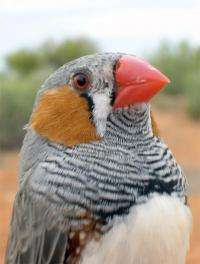Sexy sons thanks to mom

It is not the superior genes of the father, but the mother's resource investment in the eggs that makes Zebra Finch males particularly attractive. A Swiss-Australian research team lead by evolutionary ecologists at the University of Zurich has challenged the theory that females mate with superior males to obtain good genes for their offspring.
In Zebra Finches, as in most other bird species, both parents contribute to offspring rearing. The social partner of a female, however, is not always the biological father of the young. If the opportunity arises, females will choose to pair with partners other than their primary mate – with the interesting result that the offspring of different fathers have different qualities. And, as evolutionary ecologists from the University of Zurich and biologists from Macquarie University in Sydney have discovered, offspring sired by an extra-pair partner develop larger color ornaments and are more attractive to females than their social half-brothers.
Up to now, the quality differences between social and extra-pair offspring have generally been assumed to reflect the genetic superiority of the extra-pair male. Indeed, females are believed to engage in extra-pair copulation with genetically superior males to obtain better genes for their offspring. Now, Barbara Tschirren, professor for evolutionary ecology at the University of Zurich, and her team have challenged the idea of the exceptional male. In a study published in Proceedings of the Royal Society the researchers demonstrate that -- despite the observed quality differences -- the fathers of attractive sons are neither better looking nor genetically superior.
According to the study, attractive sons are not the result of exceptional genes; rather, their enhanced ornamentation is due to the mother's investment in the eggs. Tschirren was able to demonstrate that maternal resource investment decreases steadily over the course of the laying sequence of a Zebra Finch, with eggs laid early in a clutch being larger and containing more nutrients and hormones. Favoring early eggs and the first hatchlings is a worthwhile investment for the mother as these offspring have a demonstrably higher chance of survival. "It appears that there is strong competition among males to fertilize these valuable eggs early in a female's laying sequence," explains lead author Barbara Tschirren. "They try to exploit the female's egg investment bias to ensure a head start for their own offspring." She hypothesizes that sperm competition might decide the battle, with males with faster sperm being able to fertilize the most valuable eggs.
Provided by University of Zurich















